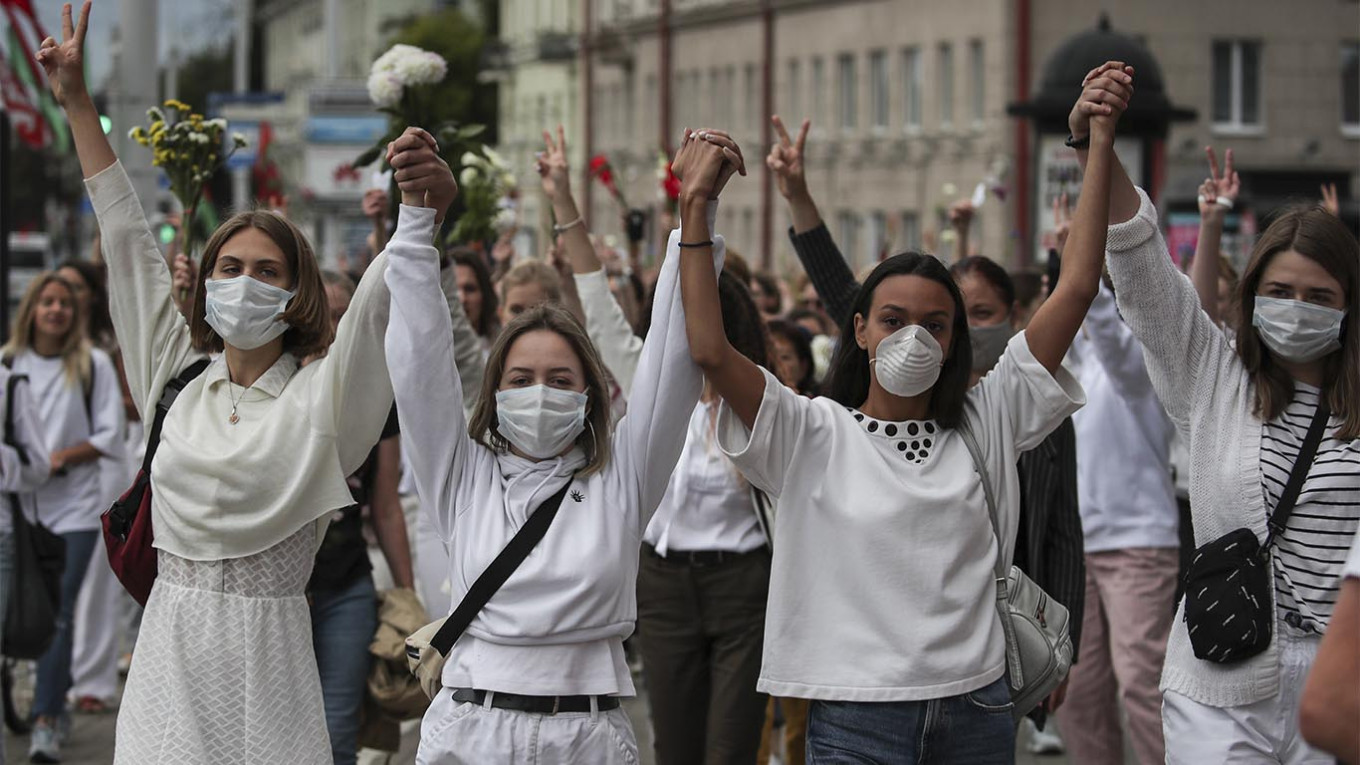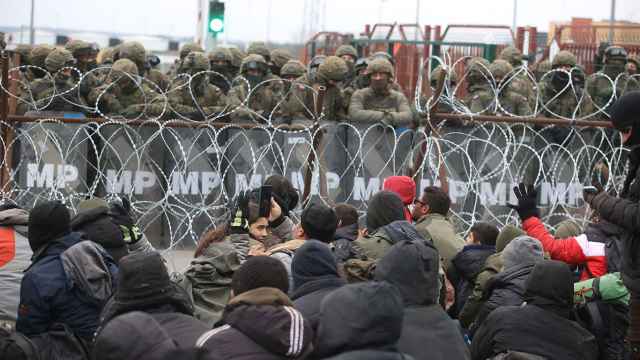Thousands of protesters formed human chains in Belarus on Thursday in a growing wave of peaceful demonstrations over President Alexander Lukashenko's disputed re-election and an ensuing brutal police crackdown.
Russia claimed the protests were being orchestrated from abroad to destabilize its ex-Soviet neighbor while European countries condemned police violence and backed fresh sanctions against Lukashenko.
Several thousand men and women, many wearing white and holding flowers and balloons, held hands and walked through the capital Minsk to protest against police brutality during four nights of unrest since Sunday's vote.
The mood was more relaxed than on previous days as protesters strolled along a central street and lined main roads with drivers honking horns in support.
Supporters gave out free hot drinks and biscuits and police kept a low profile.
Similar human chains formed in half a dozen other cities, local media reported, while activists called for further protests at night.
Lukashenko's opponents accuse him of rigging the election to defeat his main rival, popular opposition candidate Svetlana Tikhanovskaya, who has left the ex-Soviet country for neighbouring Lithuania.
People came out to contest the vote results and police used stun grenades, rubber bullets, tear gas, water cannon and, in at least one case, live fire to disperse the crowds.
At least two people have died and hundreds have been wounded in the violence while nearly 7,000 have been arrested.
'Change!'
On Thursday, demonstrators held placards reading "Change!" and "No violence" and wore white bracelets, one of the symbols of the opposition movement.
"We want to show that we, the women of our country, are against violence," said Yekaterina, a 38-year-old hairdresser wearing a white sweater and jacket and holding a bunch of white flowers.
Maria, a 35-year-old sales assistant, said she came out in her lunch break.
"We want people to be able to protest peacefully, after all they didn't want anything bad, just a fair count of the votes."
A religious procession of various Christian denominations also took place in Minsk while workers at a several factories reportedly held strikes.
'What can we do to help?'
Russia's Foreign Ministry on Thursday denounced what it called "clear attempts at outside interference" aiming to destabilize its neighbour.
It said it was "concerned" at the "violations of public order."
The leaders of neighboring Poland and the Baltic states urged Lukashenko to "terminate the use of force against your people immediately."
European Union foreign ministers are set to discuss possible new sanctions on Belarus at an extraordinary meeting on Friday.
"What can we do to help?" US entrepreneur Elon Musk said on Twitter in response to a call to help Belarusians.
Prominent Belarusians including Nobel Prize-winning author Svetlana Alexievich have condemned the violence and urged Lukashenko, who has ruled Belarus with an iron grip since 1994, to step down.
The interior ministry said it arrested 700 people at protests on Wednesday, bringing the total number detained since Sunday to more than 6,700.
After large-scale gatherings in Minsk and other cities on Sunday, the protests have become scattered and smaller as police cordoned off city centres and shut down public transport.
'Inhumane actions'
The Interior Ministry said Wednesday that police opened fire on a group of protesters armed with metal rods in the southwestern city of Brest, wounding one.
Officials also confirmed a second death in the unrest, after police said one protester died on Monday when an explosive device went off in his hand.
The Belarusian Investigative Committee, which probes major crimes, said a 25-year-old man died after he was detained on Sunday in the southeastern city of Gomel and sentenced to 10 days in prison.
His mother told local media he had heart problems and had gone out to see his girlfriend, not to take part in protests.
In an interview with RFE/RL, Alexievich, winner of the 2015 Nobel Literature Prize, spoke of her shock at the "inhumane, satanic" actions of riot police and urged Lukashenko to go peacefully.
Foreign-controlled 'sheep'
Other prominent Belarusians have joined calls for the violence to end.
Four-time Olympic biathlon champion Darya Domracheva wrote on Instagram: "Stop the violence. Do not allow this unjust horror to continue on the streets."
Several prominent journalists and presenters on state channels have tendered their resignations.
The protests broke out after authorities said Lukashenko won 80% of the vote in Sunday's election to secure a sixth term.
Lukashenko, 65, has dismissed the demonstrators as foreign-controlled "sheep."
The protest movement arose in support of Tikhanovskaya, a 37-year-old political novice who ran for president after potential opposition candidates including her husband were jailed.
The official results gave her 10% of the vote, but Tikhanovskaya said the election was rigged and claimed victory, demanding that Lukashenko hand over power.
She left for neighboring Lithuania on Tuesday as allies said she came under official pressure.
A Message from The Moscow Times:
Dear readers,
We are facing unprecedented challenges. Russia's Prosecutor General's Office has designated The Moscow Times as an "undesirable" organization, criminalizing our work and putting our staff at risk of prosecution. This follows our earlier unjust labeling as a "foreign agent."
These actions are direct attempts to silence independent journalism in Russia. The authorities claim our work "discredits the decisions of the Russian leadership." We see things differently: we strive to provide accurate, unbiased reporting on Russia.
We, the journalists of The Moscow Times, refuse to be silenced. But to continue our work, we need your help.
Your support, no matter how small, makes a world of difference. If you can, please support us monthly starting from just $2. It's quick to set up, and every contribution makes a significant impact.
By supporting The Moscow Times, you're defending open, independent journalism in the face of repression. Thank you for standing with us.
Remind me later.






